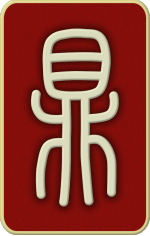
鼎 Dǐng Cooking pot (Containment) [hexagram 50]


Fire over Wind/Wood
 Fire element
Fire element
Lunar month: 6 ; Host (controlling) line : 5
The Decision
The cooking pot – great progress and very promising.
The image of a sacrificial vessel; wood is put onto the fire, transforming the offering. The wise prepare their offerings to heaven and food for the wise and virtuous. Respectful kindness nourishes the quick-witted and clear-sighted. The flexible advances upwards to gain the middle ground, resonating with the strength below. All this leads to great progress and success.
鼎: 元吉, 亨. Dǐng: yuán jí, hēng.
彖传: 鼎, 象也. 以木巽火, 亨饪也. 圣人亨以享上帝, 而大亨以养圣贤. 巽而耳目聪明, 柔进而上行, 得中而应乎刚, 是以元亨. Tuàn zhuàn: Dǐng, xiàng yě. yǐ mù xùn huǒ, hēng rèn yě. shèng rén hēng yǐ xiǎng shàng dì, ér dà hēng yǐ yǎng shèng xián. xùn ér ěr mù cōng ming, róu jìn ér shàng xíng, dé zhòng ér yìng hū gāng, shì yǐ yuán hēng.
The Image
Fire over wood forms ‘Cauldron’ or ‘Cooking pot’. The wise consolidate their aims and fulfill heaven’s will.
象传: 木上有火, 鼎; 君子以正位凝命. Xiàng zhuàn: Mù shǎng yǒu huǒ, dǐng; jūn zǐ yǐ zhèng wèi níng mìng.
Line Change 1
The cooking pot is overturned. Advantageous to throw out that which is spoilt. Accept embarrassment to help a child – no fault.
‘The cooking pot is overturned’ – this sometimes will happen. ‘Advantageous to throw out that which is spoilt’ – a sensible course of action.
初六: 鼎颠趾, 利出否, 得妾以其子, 无咎. Chū liù: dǐng diān zhǐ, lì chū pǐ, dé qiè yǐ qí zǐ, wú jiù.
象传: 鼎颠趾, 未悖也. 利出否, 以从贵也. Xiàng zhuàn: Dǐng diān zhǐ, wèi bèi yě. lì chū pǐ, yǐ cóng guì yě.
Line Change 2
The cooking pot is full. Friends are envious but cannot approach. Promising.
‘The cooking pot is full’ – proceed with caution. ‘Friends are envious’ – eventually there is no fault.
九二: 鼎有实, 我仇有疾, 不我能即, 吉. Jiǔ èr: dǐng yǒu shí, wǒ chóu yǒu jí, bù wǒ néng jí, jí.
象传: 鼎有实, 慎所之也. 我仇有疾, 终无尤也. Xiàng zhuàn: Dǐng yǒu shí, shèn suǒ zhī yě. wǒ chóu yǒu jí, zhōng wú yóu yě.
Line Change 3
The handles of the pot are damaged impairing its function. The pheasant’s rich meat is not eaten. Once rain falls, regrets vanish and so eventually good fortune comes.
‘The handles of the pot are damaged’ – it loses its proper function.
九三: 鼎耳革, 其行塞, 雉膏不食, 方雨亏悔, 终吉. Jiǔ sān: dǐng ěr gé, qí xíng sāi, zhì gào bù shí, fāng yù kuī huǐ, zhōng jí.
象传: 鼎耳革, 失其义也. Xiàng zhuàn: Dǐng ěr gé, shī qí yì yě.
Line Change 4
The cooking pot’s feet break and its contents spill. The boss’s meal is spoilt and he gets splattered. Misfortune.
‘The boss’s meal is spoilt and he gets splattered’ – trust has been broken.
九四: 鼎折足, 覆公餗, 其形渥, 凶. Jiǔ sì: dǐng zhé zú, fù gōng sù, qí xíng wò, xiōng.
象传: 覆公餗, 信如何也. Xiàng zhuàn: Fù gōng sù, xìn rú hé yě.
Line Change 5
Cooking pot with golden handles. Favorable to be persistent.
‘Cooking pot with golden handles’ – the middle position shows solidity.
六五: 鼎黄耳, 金铉, 利贞. Liù wǔ: dǐng huáng ěr, jīn xuàn, lì zhēn.
象传: 鼎黄耳, 中以为实也. Xiàng zhuàn: Dǐng huáng ěr, zhōng yǐ wéi shí yě.
Line Change 6
Cooking pot with jade decoration. Very promising. All undertakings will be successful.
‘Jade decoration’ at the top – the strong and weak resonate with each other.
上九: 鼎玉铉, 大吉, 无不利. Shàng jiǔ: dǐng yù xuàn, dà jí, wú bù lì.
象传: 玉铉在上, 刚柔节也. Xiàng zhuàn: Yù xuàn zài shàng, gāng róu jié yě.
The full set of 64 English translations is available in our new book 'Book of Changes - Deciphered' ➚.